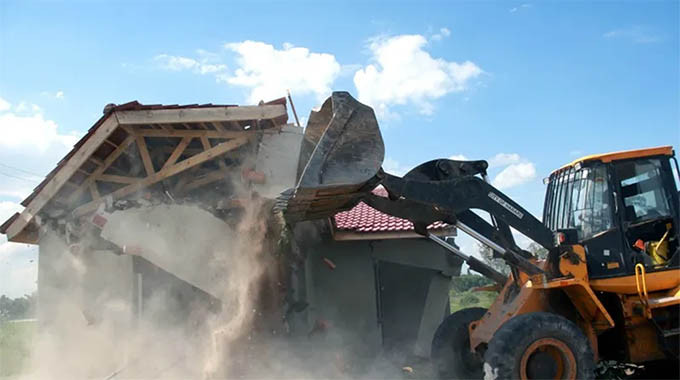
On May 19, 2025, Zimbabwe marked 20 years since Operation Murambatsvina (OM). Despite the Government of Zimbabwe’s (GoZ) efforts since 1980, constraints on decent and affordable housing accessibility remain pervasive, failing to keep up with rising housing demand.
Escalating urbanisation, driven by the unrelenting informal economy and commodification of housing, has made the legacy of OM persist. It is important to note that similar operations occurred prior to OM. Independence in 1980 triggered rural to urban migration and a population explosion in urban areas.
For example, during the colonial era, the development of the Chirambahuyo illegal settlement in modern-day Chitungwiza led to the bulldozing of homes for approximately 30 000 residents in 1980, relocating them to a planned site and service scheme. In 1983, a further 10 000 people were displaced at Russelldene, an area between Harare and Chitungwiza (Butcher, 1986).
To date, poor urban dwellers, especially in low income areas of Harare Metropolitan province, remain vulnerable to sporadic episodes mirroring OM, where home demolitions are spurred by policy inconsistencies from the Harare City Council (HCC) and law enforcement agents.
Exponential population growth from approximately 7,4 million in 1980 to between 16,9 and 17,4 million currently (Microtrends 2025, World Population Review 2025) complicates this situation. Accordingly, continuous development of robust housing programmes is critical to overcoming intractable housing challenges. OM was contested and fluid, and United Nations (UN) Special Envoy on Housing, Anna Tibaijuka, flagged basic human rights violations in her final OM report. While the GoZ aimed to restore order amidst haphazard rural and urban planning, the UN Sustainable Development Goals (SDG 11) advocate for improved housing access for all by 2030, with adequate basic services making cities inclusive, safe, resilient, and sustainable.
Congruent with the SDGs deadline and aspirations, GoZ’s ambitious Vision 2030 aims to achieve a “Prosperous and Empowered Upper-Middle Income Society by 2030” through a sequential and systematic methodology, leaving no-one behind in national development priorities, including housing delivery in cities and other human settlements. Chatiza (2022) asserts that new forms of settlement informality emerged when there was a transition from mid 1990s GoZ led housing delivery to self-provisioning, riding on fast track urban land reforms from 2000.
Although OM in 2005 harshly disrupted this, Chatiza concludes that this transition muddied traditional GoZ housing responses and exposed the daunting task of regulating extensive informality.
Underscoring importance to planned and orderly housing provision in September 2021, GoZ launched the Zimbabwe National Human Settlements Policy, targeting densification, allocation, and regularisation of housing goods and services for informal settlements through land access, tenure, and social inclusion. The National Development Strategy (NDS1, 2021-2025) is GoZ’s current socio economic development blueprint.
- Record breaker Mpofu revisits difficult upbringing
- Tendo Electronics eyes Africa after TelOne deal
- Record breaker Mpofu revisits difficult upbringing
- Greatkhalister in Comrades Marathon debut
Keep Reading
NDS1 initially aimed to deliver 220 000 housing units in urban and rural areas, a target GoZ insists was surpassed, with one million units set as the new goal. GoZ’s confidence is based on the enabling collaborative environment with the private sector. Notwithstanding this enabling policy environment, Mbiba (2022) argued that town planning and demolitions are intertwined, with a history of demolitions driven by government policies aimed at urban development and addressing informal settlements.
The GoZ argues that demolitions target illegal structures built without permits or on reserved land, while critics argue that such actions violate human rights and displace communities. The complexities are compounded by land disputes, political interests, and a lack of adequate housing options (Mbiba 2022). Widely embedding Private Public Partnerships (PPPs) has become vital. Significant benefits of housing PPPs include increased private sector funding, risk sharing, and enhanced efficiency through innovative construction methods.
PPPs create employment opportunities, improve essential infrastructure, and contribute to sustainable development, hence innovatively addressing housing challenges. In 2011, the Melinda and Bill Gates Foundation donated US$5 million to HCC for the renovation of 58 hostels in Mbare suburb that were deemed unfit for habitation. However, political issues delayed this housing renewal project.
Remarkably, in January 2025, Local Government minister Daniel Garwe halted an impending demolition of over 5 000 housing units, sternly rebuking HCC and threatening legal action against any council official ordering demolitions without proper notice. The minister’s intervention followed HCC’s pattern of controversial demolitions, raising serious questions about residents’ dignity as demolitions in Harare’s Belvedere suburb had violated basic human rights. Exploitation of unsuitable land by land barons, such as wetlands, is pervasive, resulting in flooding.
Accordingly, GoZ, through town planning and environmental management agencies, needs to embed robust housing development to mitigate the exploitation of ecologically fragile land. This conforms with Environmental Management Act stipulations that certain projects require an environmental impact assessment before implementation to evaluate the potential environmental and human health effects of a project. Housing developments are listed in the First Schedule of the Act.
Alongside the implementation of the Presidential Title Deeds and Regularisation Programme, where more than 1 000 Epworth residents benefited in 2024, similar government guaranteed programmes are required. Appropriate technology usage in housing addresses affordability, sustainability, and accessibility challenges.
The GoZ’s technology and development incubation unit, The Scientific and Industrial Research and Development Centre, promotes the use of alternative materials such as stabilised soil blocks and recycled materials to reduce costs and environmental impact. The Ministry of Public Works must robustly design model houses and infrastructure integrating appropriate and cost effective technology into the housing sector while improving living conditions.
l To read full article visit www.theindependent.co.zw.
Mathende is a qualified social worker, social justice activist, and social development scholar who has previously worked for Africa’s largest municipality, the City of Johannesburg Metropolitan Municipality. Nhapi is an independent researcher associated with the University of Johannesburg, with interests in social policy and social security issues. These weekly articles are coordinated by Lovemore Kadenge, an independent consultant, managing consultant of Zawale Consultants (Pvt) Limited, past president of the Zimbabwe Economics Society and past president of the Chartered Governance & Accountancy Institute in Zimbabwe. — [email protected] or mobile: +263 772 382 852.
The technology used to develop the elite Diplomatic Village for accommodating diplomats in 2024 for a Southern African Development Community summit can be replicated in building pro poor housing projects. This project symbolises renewal and forward thinking leadership, showcasing a vision for a more organised urban landscape.
The trend of the so-called sabhuku deals, where village heads sell peri-urban state land to prospective home-seekers also complicates housing access dynamics.
The Lands, Agriculture, Fisheries, Water and Rural Development ministry issued a stern warning to traditional leaders against selling state land. However, at the village level, “sabhuku deals” land or housing transactions are informal, customary, and cheap or barter based, outside formal legal systems, complicating accessibility to housing.
Urban to rural migration, particularly among the middle-aged population, has reinforced the lucrativeness of “sabhuku deals”.
If well-managed and regulated, ensuring the deals do not conflict with government land reform policies, it can be a viable housing development option. Legally, under Zimbabwean statutory law, “sabhuku deals” are not recognised, as land ownership and transfers go through formal processes.
Conclusion
Proper execution of housing strategies will reduce cement and associated construction material prices, leading to more people being able to afford to build decent houses. Viable PPPs, complemented by human rights based approaches and appropriate technology usage, enrich a pro-poor access to housing framework.
Mathende is a qualified social worker, social justice activist, and social development scholar who has previously worked for Africa’s largest municipality, the City of Johannesburg Metropolitan Municipality. Nhapi is an independent researcher associated with the University of Johannesburg, with interests in social policy and social security issues. These weekly articles are coordinated by Lovemore Kadenge, an independent consultant, managing consultant of Zawale Consultants (Pvt) Limited, past president of the Zimbabwe Economics Society and past president of the Chartered Governance & Accountancy Institute in Zimbabwe. — [email protected] or mobile: +263 772 382 852.











